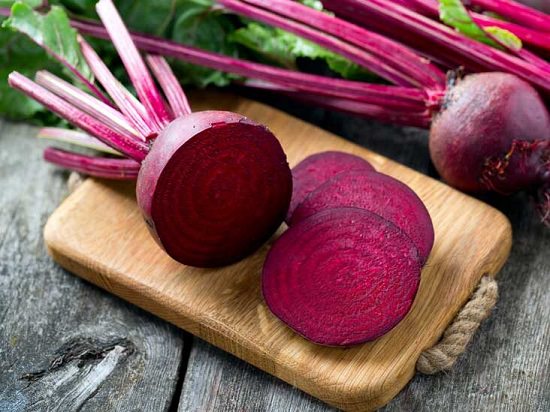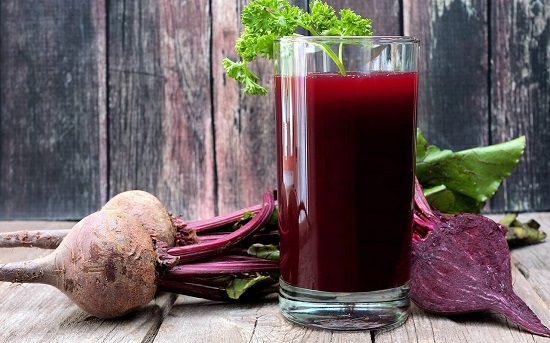Can We Apply Beetroot Juice on Face Overnight? Get the answer to this question along with some useful information in this article!
Overview
The beetroot is the primary root or the taproot of the beet plant, whose leaves are also edible. It is famous as a cultivated variety or subspecies of Beta vulgaris. The plant’s domestic origins lie in the Middle East. It has found its way to plates across the world as a raw, roasted, boiled, shredded, pickled, or steamed ingredient in salads, curries, and soups. People of some cultures use it to make wine. And recognizing its concentrated sugar content, Napoleon decreed it as a primary sugar source to address a sugar scarcity in wartime.
Nutritional Contents
Beetroot is mainly composed of:
- 88% Water
- The rest is made up of 10% carbohydrates, 2 % protein, and less than 1% fat.
- As implied earlier, simple sugars, glucose, and fructose make up to 80% of the carbs in beetroot.
Beetroot is a rich source of essential vitamins and minerals:
- Vitamins C and B9 (Folate)
- Potassium
- Iron copper
- Phosphorous
- Manganese
Beetroot also provides a host of phytonutrients that are plant nutrients responsible for antioxidant and anti-inflammatory properties. Betalain pigments such as betacyanin and betaxanthin give beetroots their distinct color. Vitamin C and manganese are the main factors behind the antioxidant effect.
The anti-inflammatory effect is mediated by the phytonutrients betanin, isobetanin, and vulgaxanthin that inhibit the COX enzyme (cyclo-oxygenase) that triggers inflammation. Another phytonutrient, Betaine, reduces homocysteine build-up, which, left unregulated, would stimulate unwanted inflammation. These phytonutrients also contribute to detoxification in the liver and stomach. Beetroots also have many vital inorganic nitrates.
Beetroot For Skin
Research shows that the nutrients in beetroot boost skin health and appearance. The vitamin C in beetroot boosts collagen. The antioxidants hydrate skin and repair it to prevent and reduce signs of aging.
The antioxidant and anti-inflammatory elements in beetroot also aid in clearing the skin by fighting acne and mitigating blemishes.
Phytonutrients in beetroot juice naturally eliminate toxins and purify blood for glowing skin. Vitamin C decreases melanin production, and it also effectively lightens dark circles and hyperpigmentation.
Can We Apply Beetroot Juice on Face Overnight?
Yes! Owing to the myriad of benefits on the skin, beetroot can be applied safely on the skin or face overnight unless you are allergic to it. The best way to do this is by making a beetroot face mask.
Face Masks
When combined with other natural ingredients, regularly using beetroot juice facemasks can maximize skin benefits.
- Mix 3 tablespoons of beetroot juice with four tablespoons of plain yogurt. apply this on the face and neck and rinse off after 15 minutes.
- Mix 1 tablespoon of whole milk with two tablespoons of beetroot juice and three drops of almond oil. Massage this mask into the face and rinse after 10 minutes.
- Mix 1 tablespoon of beetroot juice and one tablespoon of tomato juice and apply on hyperpigmented areas for 15 minutes to even out skin tone.
- Mix 1 tablespoon of beetroot juice with two tablespoons of honey and apply all over the face and neck. Rinse after 15 minutes.
Beetroot Juice
- Select a small/medium-sized beetroot that is firm, smooth-skinned, and rich in color. It shouldn’t have any signs of surface damage like spots, bruises, or soggy areas that indicate spoilage.
- Wash the beetroot well and peel it.
- You can use a juicer to get a smooth thick juice out of the beets. Otherwise, you can use a blender to blend the beets and then squeeze it with a fine mesh cloth to obtain a pulp-free juice.
- Refrigerate the juice in an airtight container for up to 24 hours.
Precaution
- Beetroots are high in oxalates, which can lead to kidney stone formation.
- Eating beetroot may turn urine and stool pink/red, commonly called beeturia. You may mistake it for blood and hence become falsely alarmed.
- Beetroot allergy on contact presents as skin rash, itching, swelling, and hives. On consumption, diarrhea, nausea, and also vomiting may be noted. Seek medical help if symptoms persist.
Take Home
Beetroot is hence a great household, easily available ingredient that you can use for your skin. The Vitamin C, anti-oxidants and phytonutrients in beetroot make it an excellent addition to your skin care routine!



